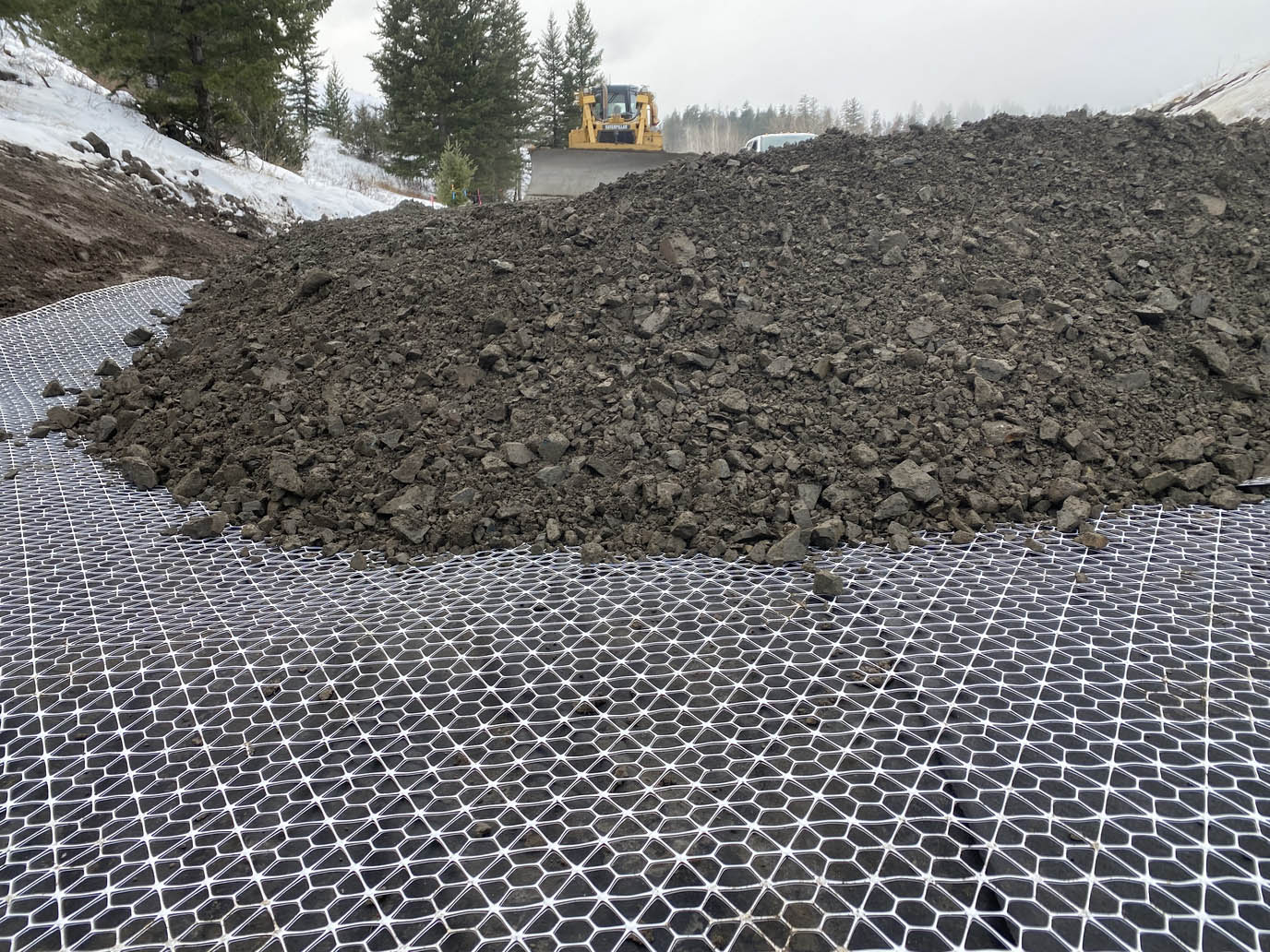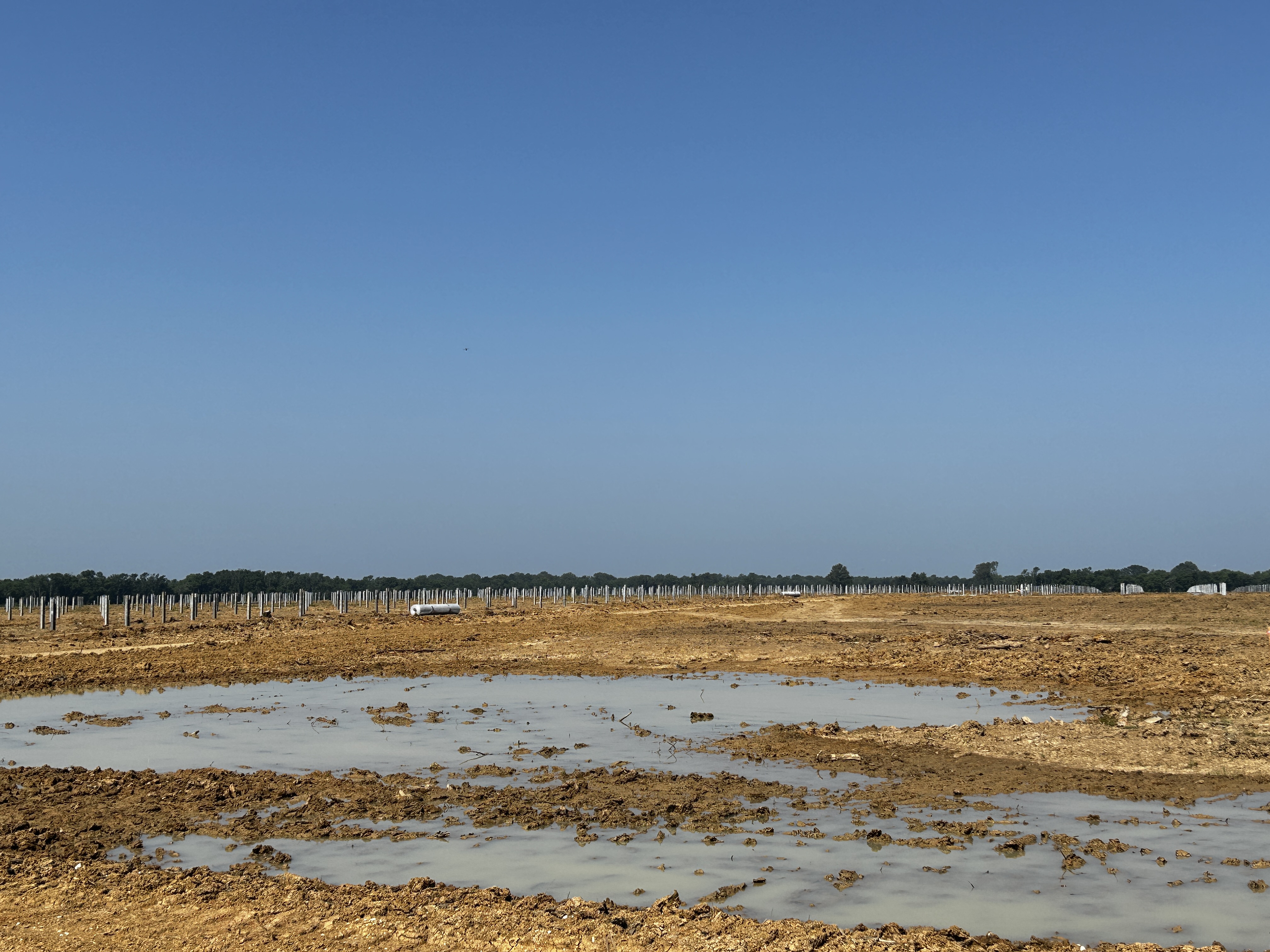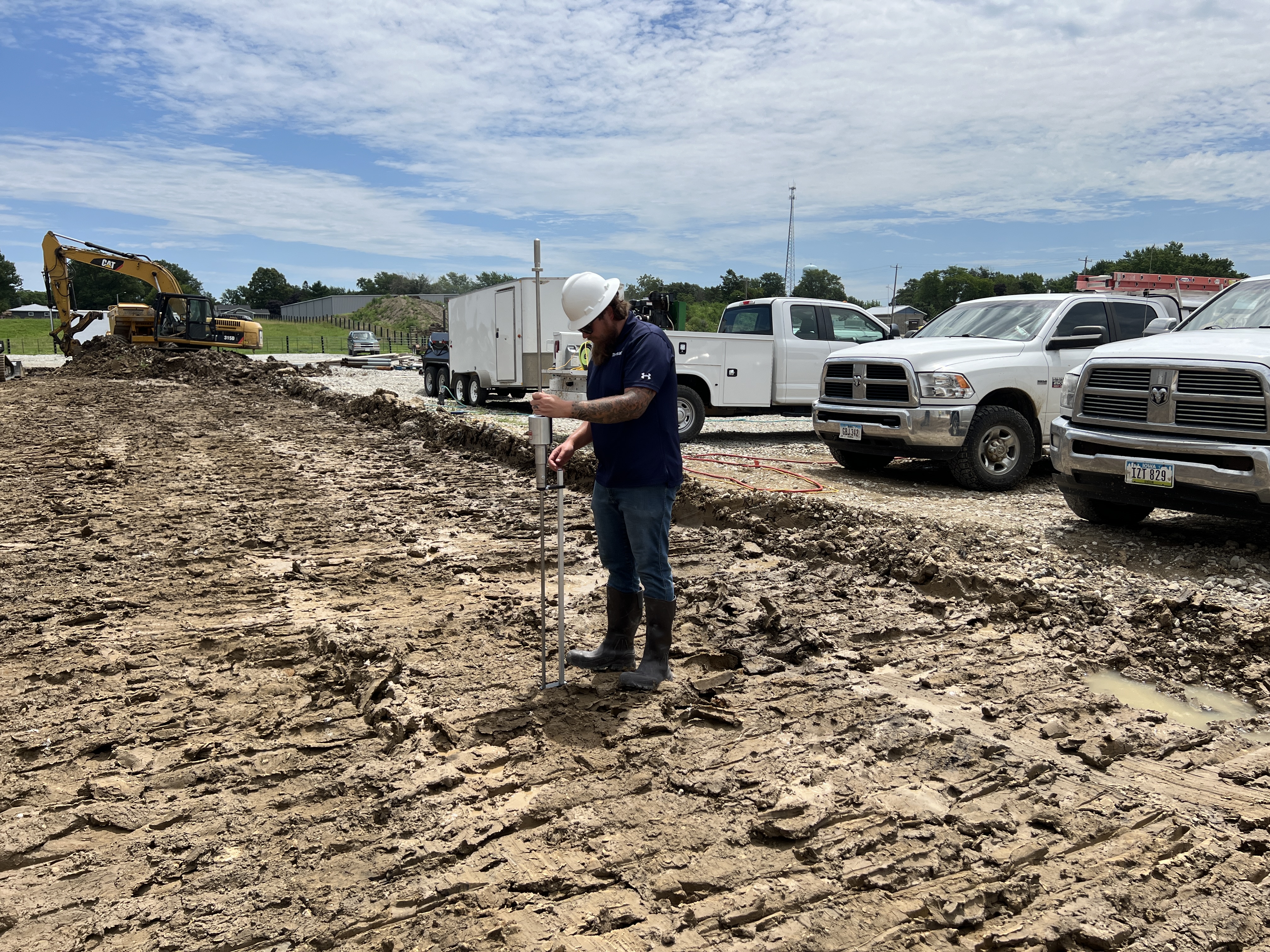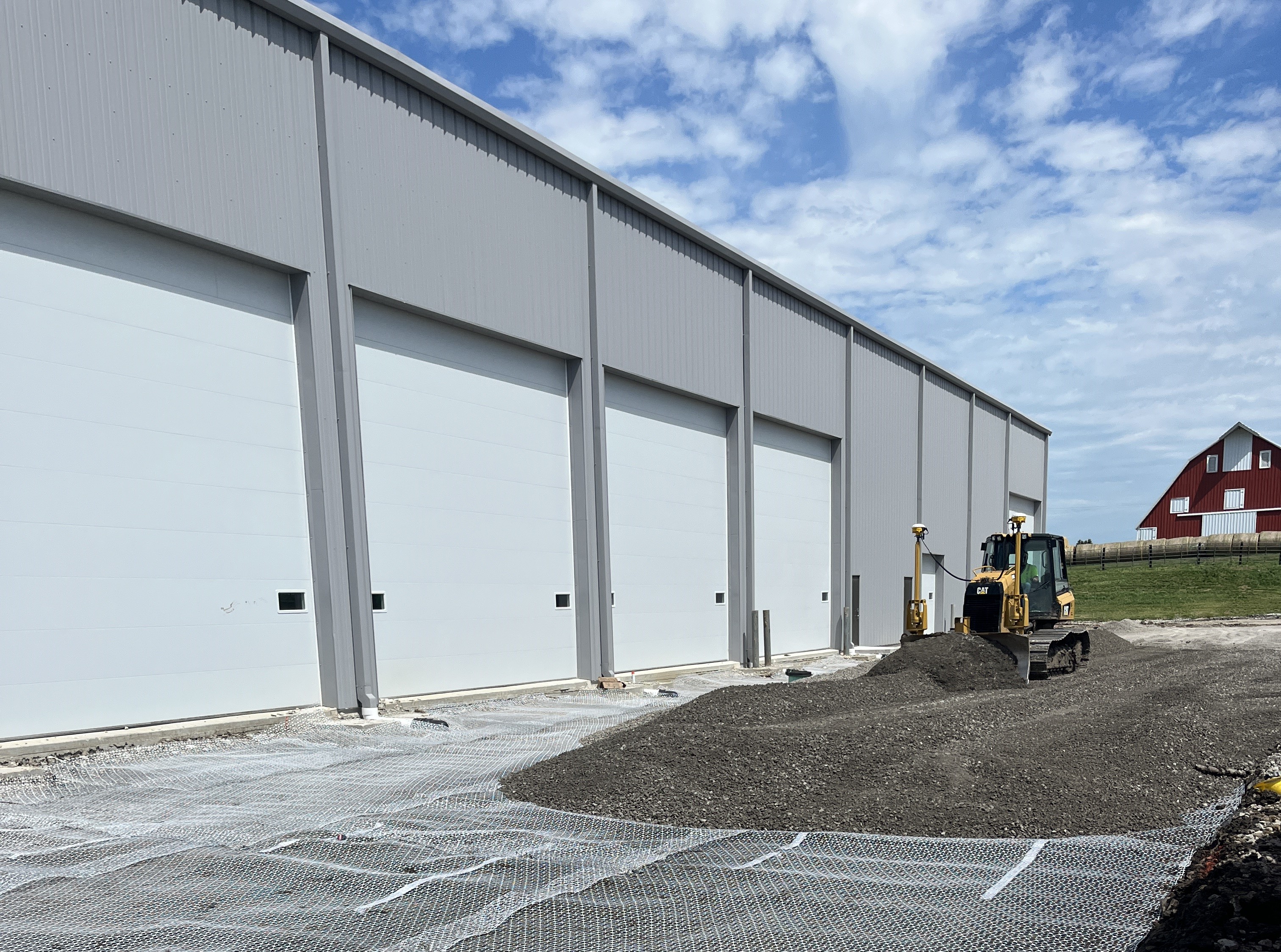Strategize for Seasonal Uncertainties with InterAx Geogrid
by Katie Phillips, on November 11, 2024
Unpredictable weather during the winter and spring months can cause excessive blows to construction budgets and schedules. When muddy job sites or cold temperatures create standstills, the only ones who find themselves in the black instead of the red at the end of the season are those who have proven strategies ready to go in their back pockets.
 One proven measure that contractors are using to navigate seasonal uncertainties on their construction sites is Tensar InterAx® geogrid. InterAx is the most advanced geogrid for trafficked surfaces that works to stabilize soft soils. It has openings that allows aggregate to strike through and provides confinement to prevent it from spreading. This improves load distribution over weak subgrades and reduces the amount of required aggregate. The site becomes immediately accessible, your crew stays on schedule and best of all - your projects stay on budget. Here are just a couple of recent examples of customer success where they overcame wet conditions with interAx geogrid and avoided otherwise devestating hits to their projects.
One proven measure that contractors are using to navigate seasonal uncertainties on their construction sites is Tensar InterAx® geogrid. InterAx is the most advanced geogrid for trafficked surfaces that works to stabilize soft soils. It has openings that allows aggregate to strike through and provides confinement to prevent it from spreading. This improves load distribution over weak subgrades and reduces the amount of required aggregate. The site becomes immediately accessible, your crew stays on schedule and best of all - your projects stay on budget. Here are just a couple of recent examples of customer success where they overcame wet conditions with interAx geogrid and avoided otherwise devestating hits to their projects.
.jpg?lang=en-US&width=250&height=187) The Challenge: Soils on the Golden Triangle Solar Farm site in Artesia, MS were composed of both lean and fat clays. They were relatively stable during the dry seasons but created considerable challenges during the rainy season. These soils could not support the volume of construction traffic needed to build the solar facility, and the project budget could not absorb the cost needed to build the required pavement section that would keep the roads working.
The Challenge: Soils on the Golden Triangle Solar Farm site in Artesia, MS were composed of both lean and fat clays. They were relatively stable during the dry seasons but created considerable challenges during the rainy season. These soils could not support the volume of construction traffic needed to build the solar facility, and the project budget could not absorb the cost needed to build the required pavement section that would keep the roads working.
 The Solution: After using Tensar+ design software to evaluate multiple options, InterAx NX650 geogrid along with the desired 6” aggregate base was recommended as the least expensive option. The customer benefited from the geogrid-stabilized roadways through lower upfront construction costs and minimized maintenance needs during the course of construction. And estimated $1 million is aggregate cost was saved.
The Solution: After using Tensar+ design software to evaluate multiple options, InterAx NX650 geogrid along with the desired 6” aggregate base was recommended as the least expensive option. The customer benefited from the geogrid-stabilized roadways through lower upfront construction costs and minimized maintenance needs during the course of construction. And estimated $1 million is aggregate cost was saved.
Click here to view to full project profile.
 The Challenge: The site was originally stabilized with a woven fabric and a 4” crushed rock section. The section failed in the Spring of 2024 when it encountered heavy rains and construction traffic. The Owner and Contractor needed a reliable solution that would fix the problem before they could begin paving the building aprons. Given the previous failure, it was important that the solution save them on added construction costs. The owner was considering a geogrid and a chemical solution.
The Challenge: The site was originally stabilized with a woven fabric and a 4” crushed rock section. The section failed in the Spring of 2024 when it encountered heavy rains and construction traffic. The Owner and Contractor needed a reliable solution that would fix the problem before they could begin paving the building aprons. Given the previous failure, it was important that the solution save them on added construction costs. The owner was considering a geogrid and a chemical solution.
 The Solution:The Tensar design consisted of a 6” PCC pavement over a 7” aggregate section with an InterAx NX850 geogrid based upon the subgrade modulus. Tensar and Coleman Moore put together a submittal for the Contractor to present to the Owner. The Owner saved $30,000 on a smaller sized apron job vs the chemical stabilization option. Construction time was also saved since Lenox, IA continued to receive moisture, which would have prolonged the chemical option. Aggregate trucks continued to rut the larger site where the fabric is installed, however, rutting is not present in the geogrid stabilized areas.
The Solution:The Tensar design consisted of a 6” PCC pavement over a 7” aggregate section with an InterAx NX850 geogrid based upon the subgrade modulus. Tensar and Coleman Moore put together a submittal for the Contractor to present to the Owner. The Owner saved $30,000 on a smaller sized apron job vs the chemical stabilization option. Construction time was also saved since Lenox, IA continued to receive moisture, which would have prolonged the chemical option. Aggregate trucks continued to rut the larger site where the fabric is installed, however, rutting is not present in the geogrid stabilized areas.
Click here to view the full project profile.
Learn how Tensar can help keep your equipment moving, reduce overall installation costs and keep you prepared during the rainy, cold months: Visit our webaite: Winter Weather Site Solutions
 One proven measure that contractors are using to navigate seasonal uncertainties on their construction sites is Tensar InterAx® geogrid. InterAx is the most advanced geogrid for trafficked surfaces that works to stabilize soft soils. It has openings that allows aggregate to strike through and provides confinement to prevent it from spreading. This improves load distribution over weak subgrades and reduces the amount of required aggregate. The site becomes immediately accessible, your crew stays on schedule and best of all - your projects stay on budget. Here are just a couple of recent examples of customer success where they overcame wet conditions with interAx geogrid and avoided otherwise devestating hits to their projects.
One proven measure that contractors are using to navigate seasonal uncertainties on their construction sites is Tensar InterAx® geogrid. InterAx is the most advanced geogrid for trafficked surfaces that works to stabilize soft soils. It has openings that allows aggregate to strike through and provides confinement to prevent it from spreading. This improves load distribution over weak subgrades and reduces the amount of required aggregate. The site becomes immediately accessible, your crew stays on schedule and best of all - your projects stay on budget. Here are just a couple of recent examples of customer success where they overcame wet conditions with interAx geogrid and avoided otherwise devestating hits to their projects.Customer Success: Over $1 Million in Aggregate Cost Saved
.jpg?lang=en-US&width=250&height=187) The Challenge: Soils on the Golden Triangle Solar Farm site in Artesia, MS were composed of both lean and fat clays. They were relatively stable during the dry seasons but created considerable challenges during the rainy season. These soils could not support the volume of construction traffic needed to build the solar facility, and the project budget could not absorb the cost needed to build the required pavement section that would keep the roads working.
The Challenge: Soils on the Golden Triangle Solar Farm site in Artesia, MS were composed of both lean and fat clays. They were relatively stable during the dry seasons but created considerable challenges during the rainy season. These soils could not support the volume of construction traffic needed to build the solar facility, and the project budget could not absorb the cost needed to build the required pavement section that would keep the roads working. The Solution: After using Tensar+ design software to evaluate multiple options, InterAx NX650 geogrid along with the desired 6” aggregate base was recommended as the least expensive option. The customer benefited from the geogrid-stabilized roadways through lower upfront construction costs and minimized maintenance needs during the course of construction. And estimated $1 million is aggregate cost was saved.
The Solution: After using Tensar+ design software to evaluate multiple options, InterAx NX650 geogrid along with the desired 6” aggregate base was recommended as the least expensive option. The customer benefited from the geogrid-stabilized roadways through lower upfront construction costs and minimized maintenance needs during the course of construction. And estimated $1 million is aggregate cost was saved.Click here to view to full project profile.
Customer Success: When Fabric Fails, InterAx Saves Considerable Time & $30k
 The Challenge: The site was originally stabilized with a woven fabric and a 4” crushed rock section. The section failed in the Spring of 2024 when it encountered heavy rains and construction traffic. The Owner and Contractor needed a reliable solution that would fix the problem before they could begin paving the building aprons. Given the previous failure, it was important that the solution save them on added construction costs. The owner was considering a geogrid and a chemical solution.
The Challenge: The site was originally stabilized with a woven fabric and a 4” crushed rock section. The section failed in the Spring of 2024 when it encountered heavy rains and construction traffic. The Owner and Contractor needed a reliable solution that would fix the problem before they could begin paving the building aprons. Given the previous failure, it was important that the solution save them on added construction costs. The owner was considering a geogrid and a chemical solution. The Solution:The Tensar design consisted of a 6” PCC pavement over a 7” aggregate section with an InterAx NX850 geogrid based upon the subgrade modulus. Tensar and Coleman Moore put together a submittal for the Contractor to present to the Owner. The Owner saved $30,000 on a smaller sized apron job vs the chemical stabilization option. Construction time was also saved since Lenox, IA continued to receive moisture, which would have prolonged the chemical option. Aggregate trucks continued to rut the larger site where the fabric is installed, however, rutting is not present in the geogrid stabilized areas.
The Solution:The Tensar design consisted of a 6” PCC pavement over a 7” aggregate section with an InterAx NX850 geogrid based upon the subgrade modulus. Tensar and Coleman Moore put together a submittal for the Contractor to present to the Owner. The Owner saved $30,000 on a smaller sized apron job vs the chemical stabilization option. Construction time was also saved since Lenox, IA continued to receive moisture, which would have prolonged the chemical option. Aggregate trucks continued to rut the larger site where the fabric is installed, however, rutting is not present in the geogrid stabilized areas.Click here to view the full project profile.
Learn how Tensar can help keep your equipment moving, reduce overall installation costs and keep you prepared during the rainy, cold months: Visit our webaite: Winter Weather Site Solutions




